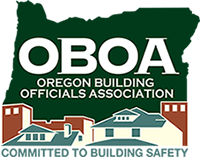- Home
- About Us
- Membership
- Job Postings
- Committees
- Events
- Special Inspection Program (SIP)
Tuesday, November 9 | 9 am – 4 pm(six-hour, full-day class)Lunch break is from 12-1 pm | Brief breaks every hour | Open Q&A E2) 2018 IRC Wall Bracing Webinar SeriesPresented by Larry Oenning, APA - The Engineering Wood AssociationClass Description:For OBOA background - October 1, 2021, the Oregon Building Codes Division rescinded both the 97-01 Portal Frame Bracing and the 13-01 Wall Bracing Statewide Alternate Methods based on the recommendation provided by the governing advisory board. The 2021 Oregon Residential Specialty Code references the prescriptive methods of the 2018 International Residential Code. This six-hour session provides a comprehensive look at residential code requirements including compliance, limitations and detailing requirements. The 2021 ORSC is using the 2018 IRC wall bracing provisions as the basis for their code requirements. This course can assist attendees in transitioning their current wall bracing and portal frame designs to comply with 2018 IRC and the new 2021 Oregon Residential Specialty Code. The six-hour training will include the following topics: 1. Meeting the IRC Bracing Provisions for Wind and Seismic (approximately 60 minutes) Beginning with braced wall panel options and then going through the steps to determine the required length of bracing for wind and, if required, seismic this session: 2. Simplified Wall Bracing & APA Wall Bracing Calculator for the 2018 IRC Work through some examples using the 2018 IRC wall bracing provisions. We then review the IRC Simplified Wall Bracing, APA Simplified Wall Bracing and introduce the APA Wall Bracing Calculator. (The APA wall bracing calculator a free online tool and is specifically referred to on Oregon.gov Codes and Standards website at https://www.oregon.gov/bcd/codes-stand/Pages/residential-structures.aspx
3. Wall Bracing in High Seismic SDC D0 – D2 Regions (approximately 90 minutes) Provide a comprehensive look at residential code requirements in high seismic regions, including limitations and detailing requirements. 4. Wall Bracing Examples in High Seismic SDC D0 – D2 Regions (approximately 90 minutes) A step-by-step walkthrough using the 2018 International Residential Code in the design procedure, this session aims to reinforce an understanding of wall bracing through fully worked-out examples. Discussion topics will include different approaches to hybrid solutions and additions. 5. Portal Frames – Oregon (approximately 40 minutes) Participants will recognize the role of portal frames in resisting lateral loads, identify the different portal frame options in the 2018 International Residential Code (IRC), spot the key elements of a portal frame and avoid common errors. Learning Objectives:
Target Audience:
Levels of Expertise:
About our Presenter:
ICC Preferred Provider Program Continuing Education Credit (ICC PPP CEUs):OBOA is an approved International Code Council (ICC) Preferred Provider. The Preferred Provider Program recognizes and promotes ICC-approved educational offerings as they relate to codes, standards and guidelines, as well as building construction materials, products and methods. ICC certificate holders may obtain ICC CEUs from Preferred Providers that can be applied toward the renewal requirements of ICC’s certification program. It is the intent of OBOA that all classes offered at institutes will be approved for the Preferred Provider Program. ICC PPP Pending Approval | 0.6 CEUs (must attend full six hours for credit) An ICC CEU is a continuing education unit; each 10 clock hours of continuing education equals 1 CEU. Our typical one-day seminar has 6 hours of instruction, or 0.6 CEUs. Credit is awarded for a variety of activities wherein the objective is achieving relevant professional knowledge beyond that required for initial certification. Participation in all OBOA courses are approved for International Code Council (ICC) certification renewal continuing education credits as noted for each class. Please check with your appropriate jurisdiction and/or institution regarding your specific continuing education credit needs. Return to main 2021 OBOA Fall Institute Home Page |

 Larry Oenning, P.E., is an Engineered Wood Specialist with the Field Services Division of APA – The Engineered Wood Association. Larry’s territory is the Pacific Northwest where he works to promote engineered wood product growth for APA member companies. He has a diverse background in both construction management and building material sales. Prior to joining the APA, Larry was General Sales Manager for Louisiana-Pacific Corporation where he managed a field sales team responsible for the sales of all LP products in Western Canada and Northwest United States. Before LP, Larry had 20 years of experience as a commercial construction manager in the Southwest and Pacific Northwest where he built over 60 significant commercial projects of different types, many of which were primarily wood construction (including hotels, apartments, office buildings, retail buildings and large distribution facilities). Larry has a Bachelor’s and Master’s degrees in Civil Engineering (Structures) from Washington State University. Larry is a registered Professional Engineer in the State of California.
Larry Oenning, P.E., is an Engineered Wood Specialist with the Field Services Division of APA – The Engineered Wood Association. Larry’s territory is the Pacific Northwest where he works to promote engineered wood product growth for APA member companies. He has a diverse background in both construction management and building material sales. Prior to joining the APA, Larry was General Sales Manager for Louisiana-Pacific Corporation where he managed a field sales team responsible for the sales of all LP products in Western Canada and Northwest United States. Before LP, Larry had 20 years of experience as a commercial construction manager in the Southwest and Pacific Northwest where he built over 60 significant commercial projects of different types, many of which were primarily wood construction (including hotels, apartments, office buildings, retail buildings and large distribution facilities). Larry has a Bachelor’s and Master’s degrees in Civil Engineering (Structures) from Washington State University. Larry is a registered Professional Engineer in the State of California.